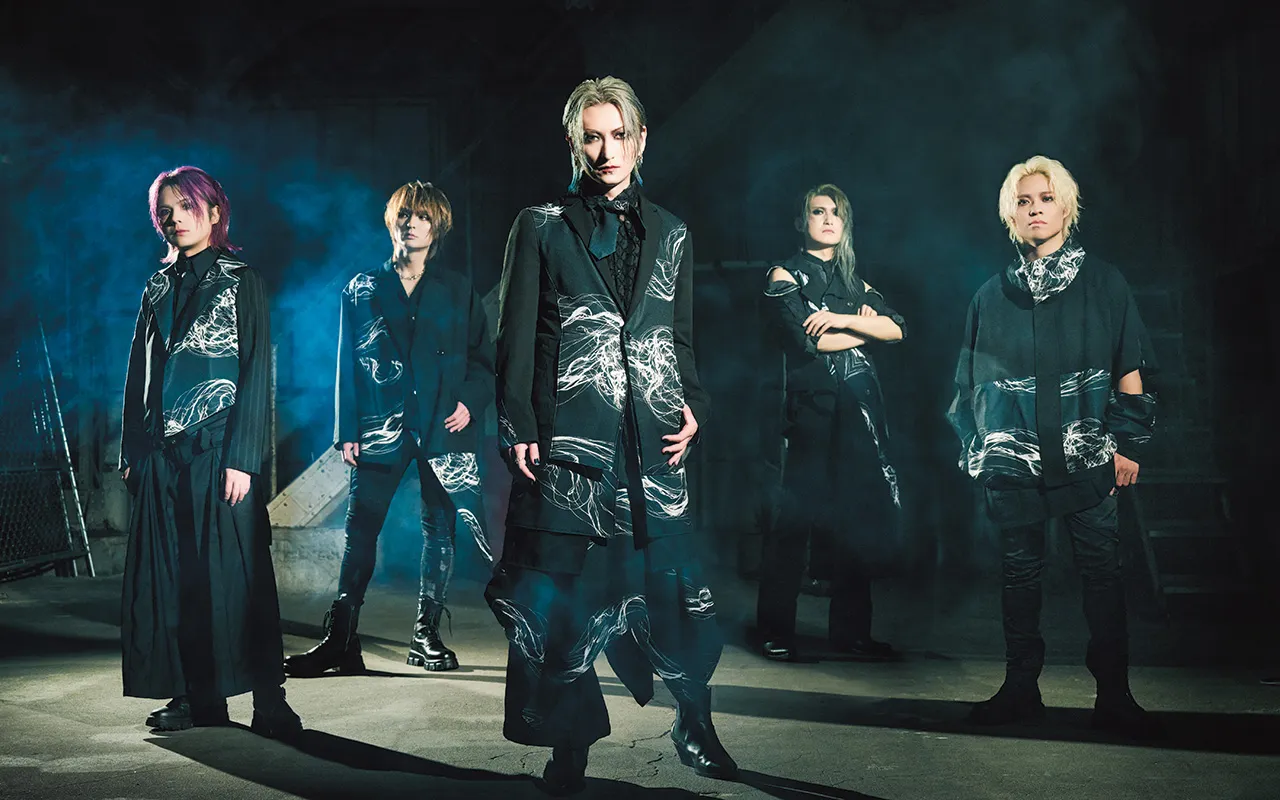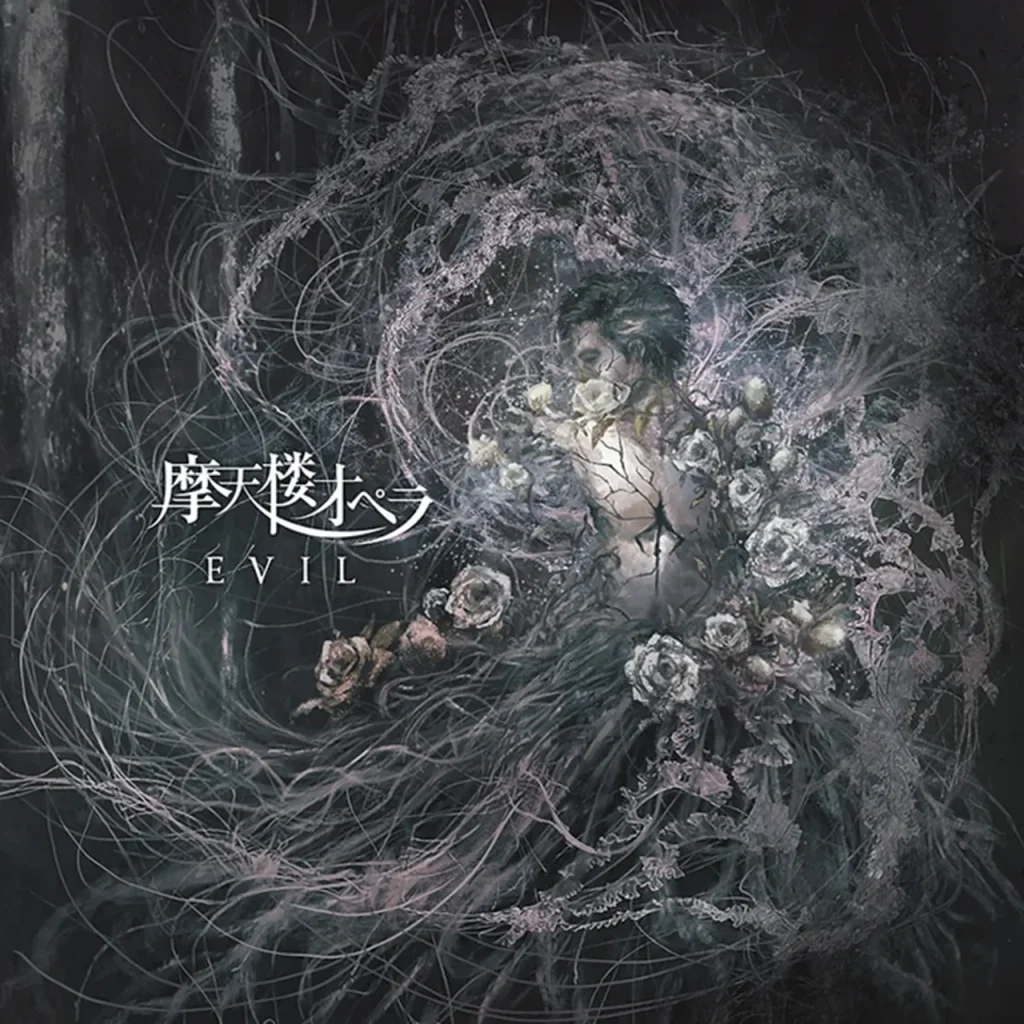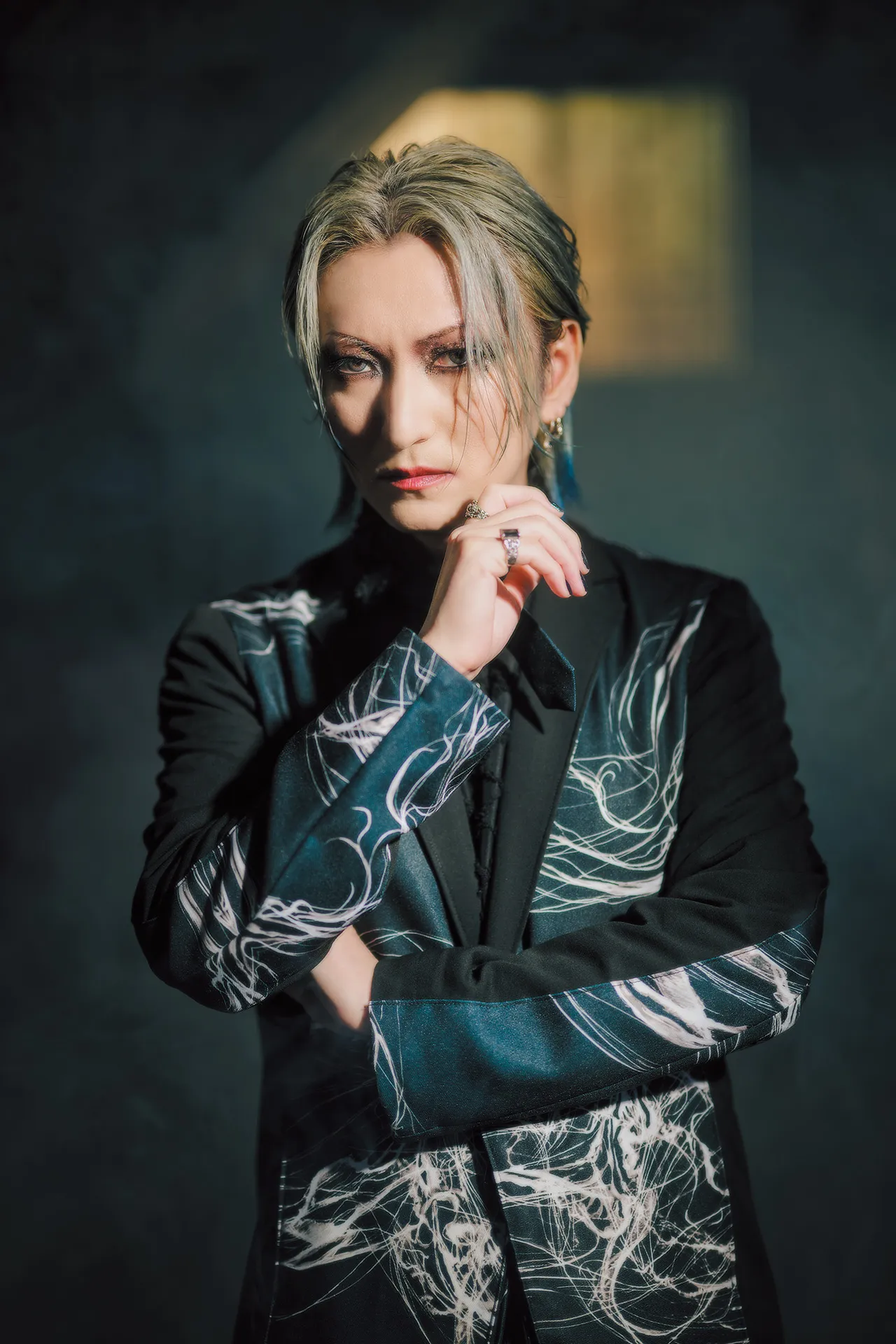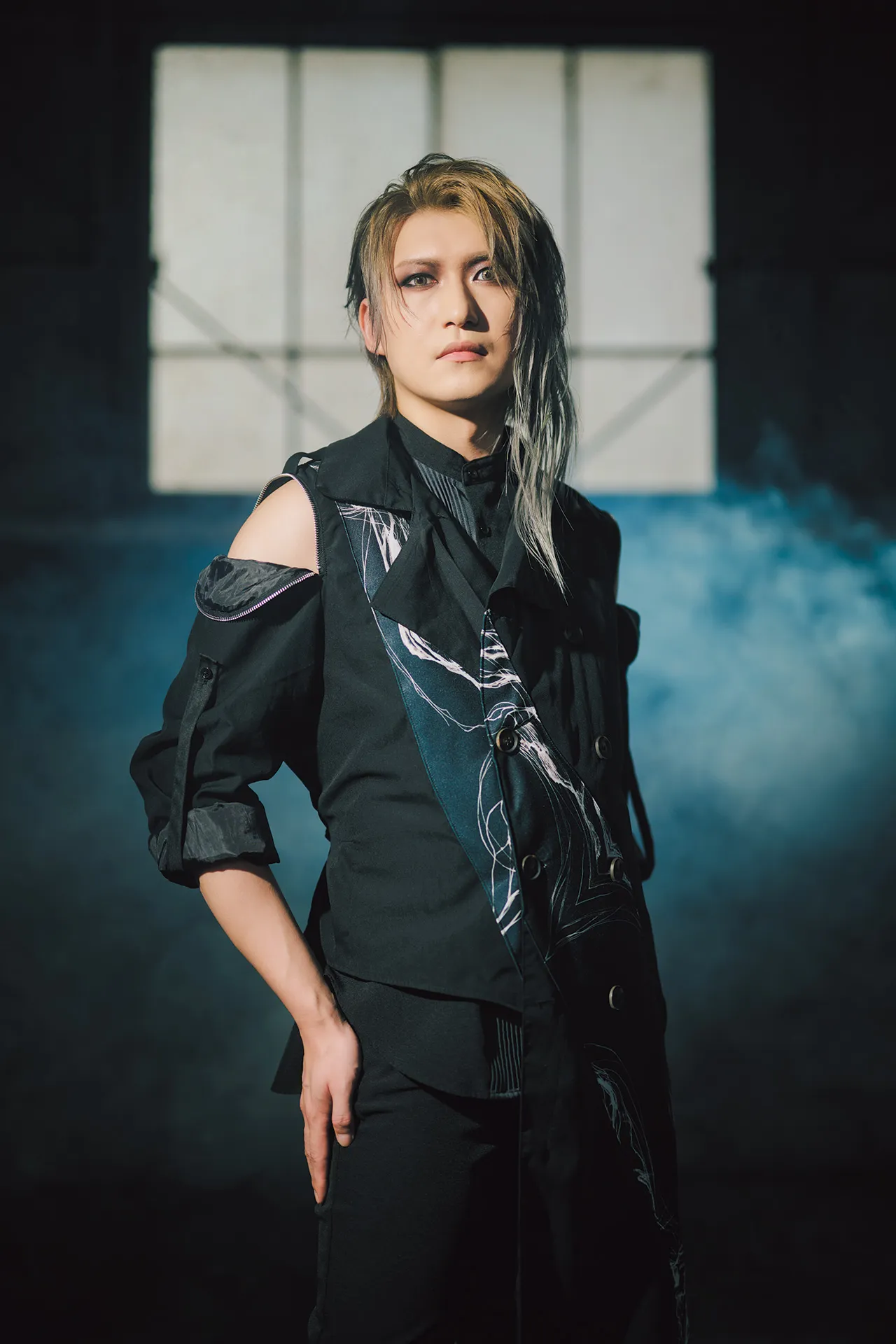02.07.2024
[Magazine Special Feature] Matenrou Opera’s New EP “EVIL”: The Complete Members’ Commentary

Unraveling the “EVIL – Malice –” Within——
On December 13, 2023, Matenrou Opera released their new EP “EVIL.” This work focuses on the dark emotions that lie within the human psyche, such as ‘malice’, ‘envy’, and ‘revenge’. For this release, we’ve had the full band provide commentary on the tracks. Additionally, the EVIL TOUR will be held on January 13th (Saturday) and 14th (Sunday) in 2024, and on the national holiday of February 12th (Monday). We hope this read enriches your experience of “EVIL”.

──What kind of work is “EVIL”?
Sono: Our previous works were centered around melodies. They were the type that you’d listen to intently. Recently, as the situation with COVID-19 began to settle, audiences finally started to be able to raise their voices at live performances again. With that in mind, this time we composed the album with a focus on tracks that would excite the crowd at our shows. We haven’t really created songs with such a dark and heavy theme before, but as we set out to make some intense music, we wanted to challenge ourselves with a heavier theme. That’s how “EVIL” came to be.
Track Title: “EVIL”
──Let’s talk about each of the tracks now. The first song is the title track of the EP, “EVIL”, isn’t it?
Sono: Yes, that’s right. I thought starting off with an intense song would really give off an “EVIL” vibe. I’ve been singing more cleanly lately, but this time around, I’ve gone back to shouting and using a powerful vocal style in many of the songs. “EVIL” is one of them, and among our recent tracks, it’s especially aggressive. I hope listeners will pay attention to that.
Yusuke: Since our last work had few main riffs, we focused on riffs and adopted an attacking theme this time. I think we managed to deliver that right from the first track, so I’d like listeners to check that out first. The guitar solo is also approached differently, experimenting with eerie scales and various challenges, so I think it turned out to be quite a fresh piece.
Ayame: The theme this time is more about evil than anything sacred. We’ve placed a lot of emphasis on how to make an impression on the listener with the first song, especially the beginning part. The way we incorporate the choir is focused on how to make an impact right from the start. For instance, using only low tones to produce an effect of wickedness. Although we fundamentally haven’t changed our approach of using strings and choir, we’ve made selective choices to match the world of this song.
Yo: I place great importance on considering what each part of the band is trying to do when we’re creating. It varies from song to song, but, for example, in the A melody, I think about which other parts to match it with quite meticulously. I’ve arranged the overall piece with this in mind, so I’d be happy if listeners could feel that there’s a purpose, like ‘Ah, this part is aiming for something.’
Hibiki: Double bass drum is incredibly fast, and in terms of the duration of these 16ths note barrages, it might be the fastest song in Matenrou Opera’s history. It brings a tempo and feeling of double bass not seen before in our music, kind of like the early days of X. The fill just before the last chorus is packed with speed, and the number of hand and foot movements is high, so I think that aspect of speed is one of the highlights of this track.
Track Title: “Shita”

──The second track has a shuffle beat and gives off a jazzy impression, making it a composition with a sense of flair, doesn’t it?
Yusuke: I’ve long thought that taking a shuffle-style rock tune, like those done by Janne Da Arc or Acid Black Cherry, and completely making metal music it would be great. Of course, within the shuffle beat, a jazzy approach shines through, but what makes this song different from other Vsual-Kei bands’ shuffle tracks is the rhythm change and tempo change in the middle, which leads to a beatdown. And as for the lyrics, which I think will come up in the discussion, they turned out to be somewhat bewitching. I think that’s inevitably where visual kei bands go when they do shuffle, but the lyrics that came out were exactly as I envisioned, without any misinterpretation, which is just splendid.
Sono: I sang the melody exactly as Yusuke had composed it, but it was incredibly challenging. The way the melody moves would naturally differ according to each composer. But I like this kind of melody and am good at singing in a bewitching manner, so I focused on bringing out that allure.
Yusuke: Regarding the guitar tone, this track is characterized by a prominent use of deep reverb and delay, creating a sense of spaciousness in the sound. For instance, in the jazzy part of the first B melody, there’s a scene where the space suddenly opens up, so I think it’d be great if listeners could experience that with speakers at a high volume or with headphones. We’re definitely trying out quite new sounds in this track.
Ayame: I’m really fond of this shuffle beat track as well, but I had to be careful not to steer the arrangement in a different direction with the way I inserted the keyboard parts. It was about figuring out how to convey the shuffle feel without actually producing it, because if you bring out the shuffle too much, it might turn into a different song than what was intended. So, I was very conscious of that. While choir and strings are the main focus, this track also incorporates various synth sounds intermittently. It adds a sparkling quality, after all.
Yusuke: I wanted to evoke a gothic feel, so I insisted on including the harpsichord. There was a desire to channel a bit of that Mana-ism, reminiscent of MALICE MIZER or Moi dix Mois.
Yo: This song was played almost exactly as the demo, and compared to the other tracks, it required an overwhelming precision. Playing at this tempo with a shuffle feel was incredibly difficult. Of course, you want to produce the shuffle feel but without it bouncing too much, so I was conscious of that sort of groove, which made the recording quite challenging.
──For a song with a different atmosphere like this, do you change how you create the sounds?
Yo: Since we’re using Line recording, we don’t really do detailed sound creation during the actual recording. It’s something we discuss and work on afterward with the engineer.
Hibiki: This song had a high-quality demo, and it felt like we could have gone with it as is without any arrangement needed. However, I have certain playing habits and setup preferences, so I started by playing according to the demo to identify any differences from my usual style or parts that were hard to play, and then I made adjustments. For example, in the chorus where I would normally keep working the bass drum, I tried playing without working it to see how it felt. Both styles seemed to fit, but I worked it in the end because it felt more like metal, and more like Matenrou Opera. The breakdowns and tempo changes are similar to what I’ve done before, so that’s kind of my forte. In the end, the finished product is a combination of the demo’s ideas and my own playing style.
──Was it difficult to write the lyrics?
Sono: Not at all, they came out smoothly. That song was racy, so I just went with that (laughs). Yes, the lyrics turned out to be quite racy (laughs).
Track Title: “Daremoshiranai Tenshi”

Yusuke: I’ve continued to be the composer for these tracks, and for this one, I started with a guitar-centric theme. I wanted to create a new kind of song using phrases with dotted eighth-note delay. Also, with the pandemic settling down and live performances becoming lively again, I kept that in mind. What I consciously aimed for in the composition was to make the live feel of the song quite apparent from the first listen. It’s the kind of song that makes you feel like folding over or raising your fists in the air. With such an understandable tune that keeps the energy up, I intentionally wrote the lyrics in a Low-key style (laughs). The chorus, for instance, keeps descending, which I thought would give the song a cooler rather than a passionate feel. The way to harmonize are layered is also quite unique; we deliberately avoided using chords that are too high… It turned out to be a song that isn’t quite typical of Matenrou Opera, but as we fine-tuned the arrangement with the members, it definitely became something that you’d expect from us (laughs)—a track that is both experimental and anticipatory in nature.
Sono: The track had a rather cool impression, so I sang the vocals with not passionate, but with a strong Visual-Kei element.
──Was there anything in particular that inspired you to write on the theme of “Daremoshiranai Tenshi (Daremoshiranai = no one knows, Tenshi = angel)”?
Sono: The lyrics revolve around a protagonist struggling against oppression in the world, and as I was writing, the phrase “miracle of an angel” came to mind, which led me to think of the title afterward. It’s about being oppressed and struggling to the point of resignation, where nothing can be done. It felt like it had a strong sense of “second year of middle school syndrome (means doing something stupid like middle school boys do)” (laughs), so I thought it was better to write it abstractly. Rather than describing real things in detail, I felt that writing abstractly would suit the song better.
In the beginning, like when one is a child, there’s still a little bit of hope when looking up at the sky, a desire to do something… Ultimately, there’s supposed to be a different view in the future, something else to see. But in the end, there’s nothing like that, no life where miracles happen. And so, the song descends and ends on that note.
This also connects to the concept of the EP; we often seek salvation, but ultimately, in the story of this song, true to the concept, there is no salvation.
──As the composer, did you have any specific intentions like, ‘I want the lyrics to be written in a certain way’?
Sono: Well, for all the songs… there isn’t anything like that.
Yusuke: You can bet nothing off-topic will come flying in. Like, for something that’s feelings the sadness and fear, you wouldn’t expect something filled with dreams and hope (laughs). For this song, I figured it would revolve more around resignation rather than hope or passion.
While writing the melody, I didn’t think it would include many positive terms. I was reminded of the song named “IT’S SHOWTIME!!” by B’z while composing. That song has a descending chorus too, but it’s quite spirited. Maybe I was listening to it back in elementary school…
Sono: That… the intense hard rock vibe from B’z didn’t really come through from that demo.
Yusuke: Yeah, that’s right, of course.
Sono: From the intro guitar phrase, it felt like a cool Visual-Kei style.
Yusuke: Sort of like B’z, or the way hard rock is done. At the end of the last chorus, there’s a moment with a long-tone guitar solo. That’s a bit of the B’z spirit (laughs).
Sono: I thought so. It’s a nostalgic approach (laughs).
Yusuke: That’s probably because B’z was somewhat playing in my head.
Sono: Good thing I didn’t listen to it first (laughs). It would have influenced me too much (laughs).
Yusuke: I think this song became one where the elements of artists I like were adopted well and encapsulated within. That’s one aspect of it.
This is probably the most unique song we’ve done so far. There’s hardly any other song that utilizes dotted eighth-note phrases like this. Well, once Ayame’s synths come in, it turns into Matenrou Opera…
Ayame: There was an original request to include piano in the chorus, but even without that, I think I would have chosen to add piano there. So, the arrangement of the song went smoothly, but I always felt the song had a sense of transparency.
It feels more open and clearer, rather than crammed and fast. The arrangement naturally became something that took that transparency into account, including the piano. If it was a song packed with other elements, the piano wouldn’t stand out. So, I think it was just the right fit.
──Regarding the arrangement of the song, you mentioned that each member of the band wouldn’t put out anything that’s completely different from what you’ve imagined. So, does this mean that the song arrangement is based on each member’s impression of the demo track?
Yusuke: I pass along all the parts, as precisely as I’ve conceived them in my mind, but what was fresh with this track when I handed it over to Ayame was, for example, the keyboard lead that comes in behind the initial intro delay phrase—that wasn’t in the demo. Also, the detailed arpeggiator phrases in the chorus, those were completely absent from the demo too. Indeed, including that phrase really did enhance the song, and although it’s barely audible in the recording, it acts as a spice that elevates the excitement. When I hear ideas that didn’t exist at the demo stage coming through, it feels like a chemical reaction within the band, and that’s really great.
Yo: Like with the song “Shita,” I played the parts for this song almost exactly as the demo, except the intro mute was incredibly difficult to play at this tempo… I tried hard, but when I asked Yusuke afterward, he said that wasn’t something he absolutely required (laughs).
Yusuke: Yes, I was wondering what kind of approach could be taken. The idea was to insert strong hits at certain accent points, but I didn’t expect it to be played with mutes… It turned out exactly as I had envisioned.
Yo: When recording, you can hear everything, so you end up working hard on it (laughs).
Hibiki: Like “Shita,” this song also had a high-quality, well-constructed phrase to start with, and I just added my personal touch to it. For instance, the latter half of the intro where there’s a double bass roll, it’s at a tempo I’m really comfortable with, and there are lots of ghost notes on the snare drum. Generally, I’m the type of drummer who changes a lot from the demo track, but this song came to me in a really good state. Sometimes, phrases created by non-drummers can be like you’d need three hands to play them, which is quite a rare type.
Yusuke: Because I love programming drums (laughs).
Hibiki: That, I think, is truly incredible.
Yusuke: Working with Hibiki in the studio and live, I take his habits, sort of sample them for my fill ideas (laughs). He made me realize that fills where the feet are going constantly and the hands are playing sixteenth notes are cool… I’ve learned a lot from that. It’s like drum tutorials or watching play-through videos to lift phrases, which I love (laughs).
Hibiki: I also take inspiration from various drummers and mix it into my own style.
